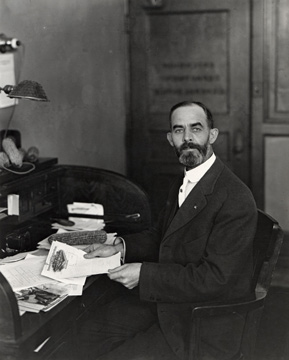
Perry G. Holden
Perry Greeley Holden was born in Dodge City, MN on October 13, 1865. After
graduating from Michigan Agricultural College in 1895 with a Master of Science
degree, he took a job at the University of Illinois as the first Professor of
Agronomy in the United States. From 1901-2 he was manager of Funk Bros. Seed
Co., helping establish their reputation as purveyors of hybrid seed.
In 1902 he started a ten-year appointment at Iowa State College, initially
holding the position of vice-dean of agriculture. In 1905 he became the first
director of Iowa extension, eight years before the Smith-Lever Act established a
national extension program in 1914. He also established demonstration farms
throughout Iowa counties. In 1904 he instituted his "corn gospel trains" which
promoted the growth of hybrid corn throughout the state.
In 1912 Perry ran in the Republican primaries for governor of Iowa. After being
defeated he took a job as the Agricultural Extension Director with International
Harvester Co. in Michigan. Here he worked persuading farmers in America to
diversify and engage in scientific agriculture. His special interest was in
alleviating the suffering in the South caused by the boll weevil through
diversification.
Perry Holden retired in 1932 and helped his wife with her egg business on their
Michigan farm. The majority of his personal and business papers were donated to
the Michigan State College Library shortly before his death in 1959. These
papers are currently held in Michigan State University's Archives and Historical
Collections Department.
[note: see also the ISU Masters thesis by Everett G. Ritland (1941) entitled
"The Educational Activities of P.G. Holden in Iowa."]
